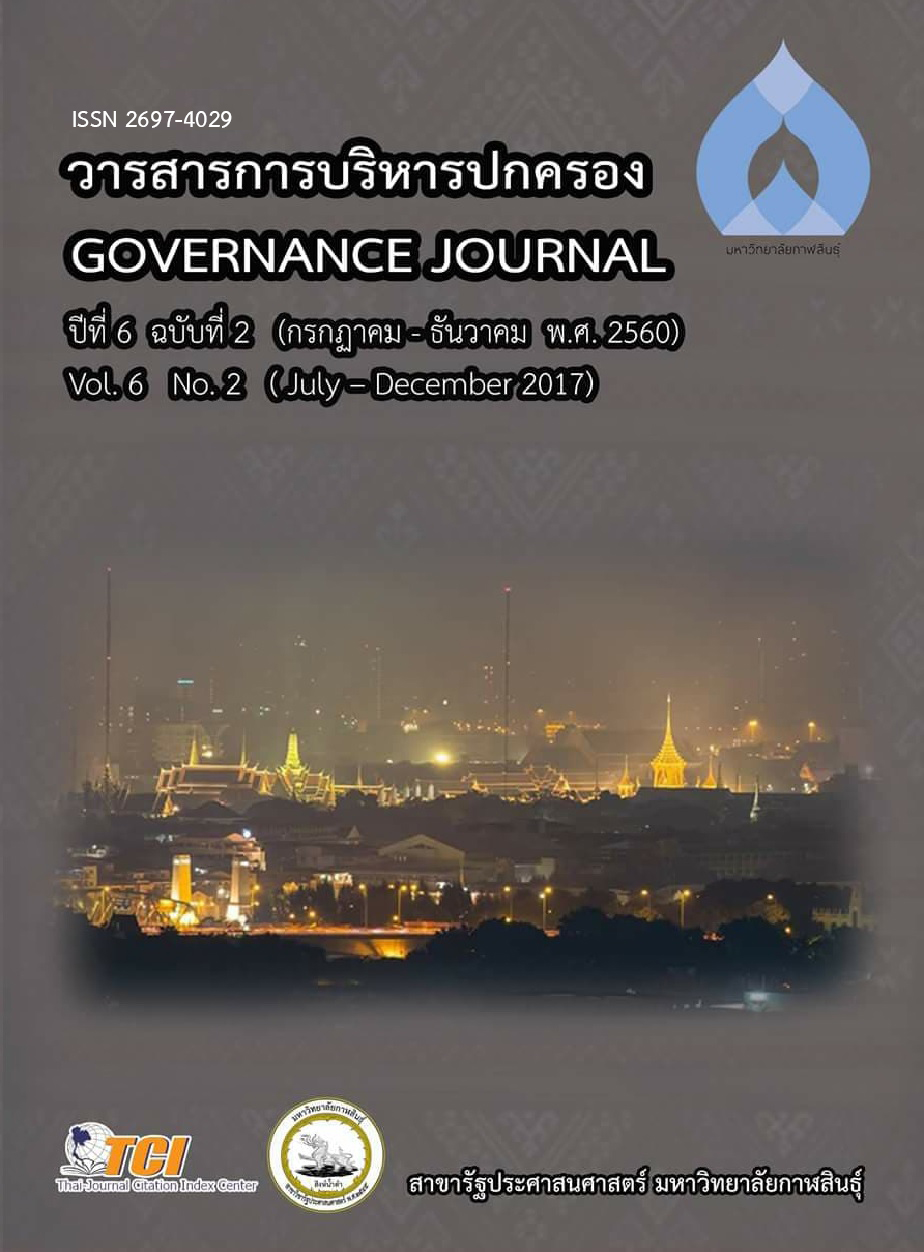ระดับการส่งผลระหว่างการรับรู้คุณประโยชน์โครงการความรับผิดชอบต่อสังคม ความไว้วางใจของลูกค้า และลักษณะทางประชากรศาสตร์ต่อการรับรู้คุณค่าตราของรัฐวิสาหกิจสาธารณูปโภคด้านพลังงานไฟฟ้า
DOI:
https://doi.org/10.14456/gjl.2017.37คำสำคัญ:
ความรับผิดชอบต่อสังคม; ความไว้วางใจของลูกค้า; ตราสินค้าบทคัดย่อ
งานวิจัยนี้มีวัตถุประสงค์เพื่อศึกษาระดับการส่งผลระหว่างการรับรู้คุณประโยชน์โครงการความรับผิดชอบต่อสังคม ความไว้วางใจของลูกค้า และลักษณะทางประชากรศาสตร์ต่อการรับรู้คุณค่าตราของรัฐวิสาหกิจสาธารณูปโภคด้านพลังงานไฟฟ้า ประชากรในการวิจัยครั้งนี้ ได้แก่ ลูกค้าของการไฟฟ้าส่วนภูมิภาค จำนวน 16,031,373 ราย สุ่มตัวอย่างแบบแบ่งชั้นภูมิตามเขตความรับผิดชอบของการไฟฟ้าส่วนภูมิภาคจำนวน 400 ตัวอย่าง จากจังหวัดตัวแทนในแต่ละภูมิภาค โดยเครื่องมือที่ใช้ในการวิจัย ได้แก่ แบบสอบถาม และวิเคราะห์ข้อมูลโดยการวิเคราะห์สมการถดถอยพหุคูณ (Multiple Regression Analysis) ผลการวิจัยพบว่า ตัวแปรความไว้วางใจด้านการเห็นต่อผลประโยชน์ของผู้อื่น ความไว้วางใจด้านการสื่อสาร/การเผยแพร่สารสนเทศ ความไว้วางใจด้านศักยภาพ/ความรู้ความสามารถ ความรับผิดชอบต่อสุขภาพและสวัสดิการของประชาชน ความรับผิดชอบด้านสิ่งแวดล้อม ความรับผิดชอบต่อวัฒนธรรม รายได้เฉลี่ยต่อเดือนมากกว่า 60,000 บาท และอายุตั้งแต่ 50 ปีขึ้นไป สามารถทำนายการรับรู้คุณค่าตราของรัฐวิสาหกิจสาธารณูปโภคด้านพลังงานไฟฟ้าอย่างมีนัยสำคัญทางสถิติที่ระดับ 0.05 โดยสามารถอธิบายการเปลี่ยนแปลงของระดับการรับรู้คุณค่าตราของรัฐวิสาหกิจสาธารณูปโภคด้านพลังงานไฟฟ้าในภาพรวมได้ 81.1% ส่วนอีก 18.9% เกิดจากอิทธิพลของตัวแปรอื่นๆ ที่ไม่ได้นำมาพิจารณา
Downloads
เอกสารอ้างอิง
tests.Psychometrical, 16,297-334.
Nelson OlyNdubisi, KhurramIftikhar, (2012) "Relationship between
entrepreneurship, innovation and performance: Comparing small and medium‐size enterprises", Journal of Research in Marketing and Entrepreneurship, Vol. 14 Issue: 2, pp.214-236.
Keller, K.L. (1998). Strategic Brand Management, Building, Measuring
and Managing Brand Equity. Upper Saddle River, NJ: Prentice Hall.
Translated Thai References
Bhootsankham B. (2012). Selection of Predictive Variables in Multiple
Regression Equations. Journal of Educational Measurement, 17 (1): 43-60.
National Statistical Office Ministry of Information and Communication
Technology (2559b). Retrieved from http://service.nso.go.th/nso/nsopublish/themes/files/electThaiRep56.pdf. On February 22, 2560.
Nijtavorn B. (2016) Written to Think: Ethics, Good Governance,
Business Sustainability - Thailand Post, May 2, 2016.
Provincial Electricity Authority (2016) Important Information
Provincial Electricity Authority 2016 Bangkok.: Printing Division, Provincial Electricity Authority
Samakoses V. (2016). Retrieved from
http://thaipublica.org/2016/09/varakorn-178/. On February 22, 25
ดาวน์โหลด
เผยแพร่แล้ว
รูปแบบการอ้างอิง
ฉบับ
ประเภทบทความ
สัญญาอนุญาต

อนุญาตภายใต้เงื่อนไข Creative Commons Attribution-NonCommercial-NoDerivatives 4.0 International License.








